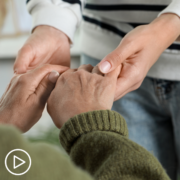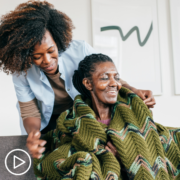After CAR T-Cell Therapy | Care Partner Tips for Staying Prepared and Organized
After CAR T-Cell Therapy | Care Partner Tips for Staying Prepared and Organized from Patient Empowerment Network on Vimeo.
What should care partners expect after CAR T-cell therapy? Nurse practitioner Daniel Verina offers tips for staying prepared, including advice on returning home, preparing the home post-therapy, and staying organized.
Daniel Verina is a nurse practitioner at the Center of Excellence for Multiple Myeloma at Mount Sinai Tisch Cancer Center in New York City.
See More from The Care Partner Toolkit: CAR T-Cell Therapy
Related Resources:
Transcript:
Katherine Banwell:
We know that patients should be near a medical center for the first few weeks after the therapy. Do you have any organizational tips for how a care partner can best prepare for the return home?
Daniel Verina:
Absolutely. So, yes, it is required. So, the patient generally stays in the hospital for two weeks and then it’s required for them to be very close to the hospital two weeks after that because it requires many visits. I think preparing for home is also knowing that they have adequate and support for transportation because sometimes the patient may have to come in two to three times a week for support usually in the bigger institutions.
Also, reconnecting back with their local oncologist just to make sure that if something does happen and they can’t get to the cancer center quick enough, they have another support. And to also to be able to monitor that, make sure they have thermometers and blood pressure machines and things that are going to be there for them when they get home.
Katherine Banwell:
Do you have any tips for making the physical space at home more comfortable?
Daniel Verina:
You know, I always say that’s individualized and everybody’s home is different. So, it’s hard to say that. I always – I’m very minimalistic. So, I always say don’t have a lot of clutter because post-CAR T you may feel a little weak or tired. So, make sure that they’re not navigating around a lot of furniture. There’s not loose rugs, equipment like that.
They may need some support even in the showers. That they may need a shower chair depending on the patient’s physicality. But that’s a very good discussion to have before they leave the hospital. Maybe our social worker teams can set up DNS [Home Health Care] and be able to put some support into the home.
Katherine Banwell:
Are there any supplies that care partners will need as they care for a patient at home?
Daniel Verina:
Supplies are very simple; I’ll be honest with you. It’s generally thermometers and maybe an automated blood pressure machine, I think, and then a pad of paper and pens that work itself. And also, like I say, it’s having the transportation or having a backup of something if the patient doesn’t feel well to get there. But in supplies, no, the patient should eat what they normally eat. I would say not as spicy because they may not be able to tolerate it, but things like that.
Katherine Banwell:
And a calendar, I would think would be pretty important.
Daniel Verina:
I love calendars. I’m a calendar writer, so I like it usually on paper, but people like it on their phone. So, I always tell patients also to keep a diary of how they feel because they come to us and I think it’s very common where you go, I have a million questions to ask you, and then they forget. So, it’s always good to say, “Oh, he had a little – he might have had some loose stools or diarrhea on this day,” but then they forgot to tell you. So, I think it’s good to document those things. And even weight –
Katherine Banwell:
Pardon me?
Daniel Verina:
And even their weight. So, all their vital signs and weight should always be documented.
Katherine Banwell:
Okay, thank you. Who is the best point of contact at a medical center if they need support?
Daniel Verina:
It’s actually the medical team. The best support is the medical team, depending on it. So, and each institution, I’ll say, may have different ways of accessing it. We have a 24-hour hotline. So, when the patient doesn’t feel well, they can call directly in. If it’s simple questions, they can always use the EMR messaging services that we have at our institution. So, each institution may have a way of doing it, but I would say always reach out to the primary team.






